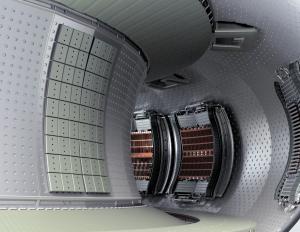A divertor test bed next door
22 Aug 2014
-
Sabina Griffith
It must have felt almost like coming home for Jérôme Bucalossi as he walked down the stairs of the ITER amphitheatre on his way to the speaker's podium. Many of his former colleagues from the French Alternative Energies and Atomic Energy Commission (CEA) had come to welcome the head of the WEST project to present the project that aims to support the ITER divertor strategy.
WEST, the acronym for "Tungsten (W) Environment in Steady-State Tokamak," was officially launched in March 2013 to contribute key insight into the steady state operation of a tungsten divertor and its impact on plasma performance. The divertor—a crucial tokamak component—must handle the highest thermal and particle loads in the vessel with up to 20 MW/m2. The decision to equip ITER with a full tungsten divertor brings new challenges both in terms of industrial series production for the actively-cooled tungsten components and in terms of operation. The WEST project was thus launched to address these issues and to minimize associated risks.
WEST is a modification of the French Tore Supra tokamak, which will transform it into an X-point divertor device. Tore Supra is the only European tokamak combining superconducting toroidal magnetic field coils, actively water-cooled plasma-facing components, and adequate additional heating systems. Thus it will be capable of testing the technologies used for the ITER high heat flux components in relevant plasma conditions. "With WEST we will be able to mimic the particle fluence of ITER nominal pulses in a few days of operation," Bucalossi said.
An integral part of the international fusion community, the WEST platform will be run as a user facility—open to all the ITER partners. The research program was only recently presented at a dedicated workshop in Aix-en-Provence.
A first short pulse ( ~10 sec) experiment is scheduled for early 2016 with a few ITER-like actively cooled sectors complemented by inertial cooled sectors made of graphite with W coating. Two years later, the next experimental campaign foresees an actively cooled divertor equipped with 456 ITER-like plasma-facing units. This setup, Bucalossi stressed, will then allow "experiments à la carte" for the study of material grades, geometry and the behavior of damaged components.


